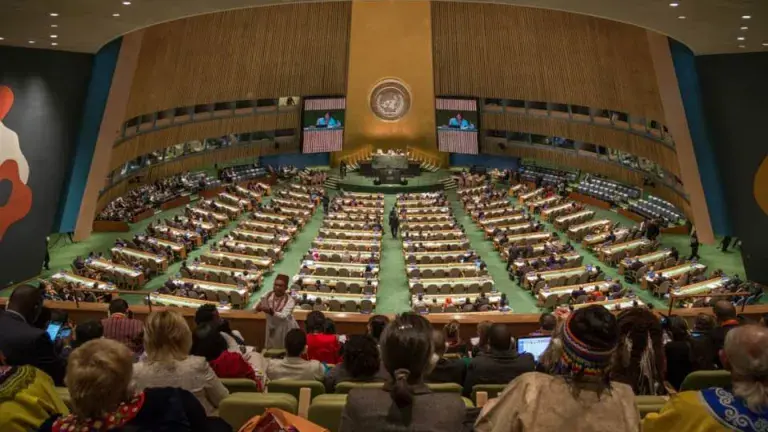
World Conference on Indigenous Peoples

On September 22 and 23, 2014, the United Nations held the World Conference on Indigenous Peoples in order to share perspectives and best practices on the realization of the rights of indigenous peoples, including to pursue the objectives of the UN Declaration on the Rights of Indigenous Peoples. The World Conference resulted in a concise, action-oriented outcome document with major commitments by the UN and member states to advance the rights of indigenous peoples.
The Need for a World Conference on Indigenous Peoples
The UN Declaration on the Rights of Indigenous Peoples was a major victory for indigenous peoples. The result of 35 years of work and negotiations, the Declaration is a global statement of the rights of Indian and Alaska Native tribes and all other indigenous peoples regarding rights of self-determination, self-government and autonomy, rights to lands and resources, the right to be free of violence and discrimination, and many other rights.
Yet since adoption of the UN Declaration in 2007, many countries have shown little understanding of indigenous peoples’ rights and little inclination to respect valuable rights to lands and resources and key political and social rights such as the right of self-determination and the right to maintain indigenous cultures, languages, and traditions.
Human rights instruments like the UN Declaration on the Rights of Indigenous Peoples have little effect unless steps are taken to implement their provisions. Without strong and effective measures at the international level to encourage countries to carry out their human rights obligations, the promise of the UN Declaration may be lost. The World Conference on Indigenous Peoples was an historic opportunity to ensure the promises of the Declaration are fulfilled, and that the rights of indigenous peoples will be respected.
What did the World Conference achieve?
More than 150 indigenous nations, organizations, and Native women’s coalitions joined together and worked for two years in advance of the World Conference to advocate for four concrete measures to bring the Declaration into effect, and thousands of indigenous peoples, nations, representatives, and governments attended the World Conference to support UN action to implement the Declaration.
All four of the measures supported by the group of indigenous nations were included in some form in the final outcome of the Conference – the World Conference Outcome Document – adopted by consensus of all 193 member states of the United Nations on September 22, 2014. These include commitments to
- Transform the Expert Mechanism on the Rights of Indigenous Peoples into an effective implementing and monitoring body for the UN Declaration.
- Secure new rules that will give indigenous governments a more appropriate status in the UN and allow them to participate fully and permanently in UN processes and activities.
- Bring greater UN study, attention, and action to address the issue of violence against indigenous women.
- Increase respect and protections for indigenous peoples’ sacred sites.
Read/watch statements made on behalf of the delegation during the World Conference
The Role of the Indian Law Resource Center
The Center works to assist Indian and Alaska Native nations and other indigenous peoples to realize their rights in the UN Declaration on the Rights of Indigenous Peoples. Recognizing the unique opportunity presented by the World Conference to secure concrete commitments by the UN and member states to respect and promote the UN Declaration, the Center worked to coordinate with over 150 indigenous nations, organizations, and Native women’s coalitions to secure positive and lasting outcomes from the Conference. The Center produced memos and guiding documents with concrete proposals on four issues, proposals broadly supported by the group of supporters. More information about the specific proposals and recommendations of the group of indigenous nations is available at Proposals. For a list of supporters, see the supporters page. The Center’s early and consistent engagement led to the ultimate success of the World Conference in 2014, and will continue in order to ensure full implementation of the World Conference Outcome Document.
What is happening now?
Now, the work to ensure these commitments are fully implemented is underway in various UN bodies – in New York and Geneva. The UN and member states have committed to making changes in the UN system to advance indigenous peoples’ rights.
It will take a concerted effort to ensure the commitments made at the World Conference are fully executed in order to secure an effective implementing body for the Declaration, establish new rules to facilitate meaningful participation of indigenous governments in the UN, and bring greater study and UN attention to ending violence against indigenous women and protecting sacred places.
Click on our updates section for the latest information about these ongoing discussions and upcoming meetings.